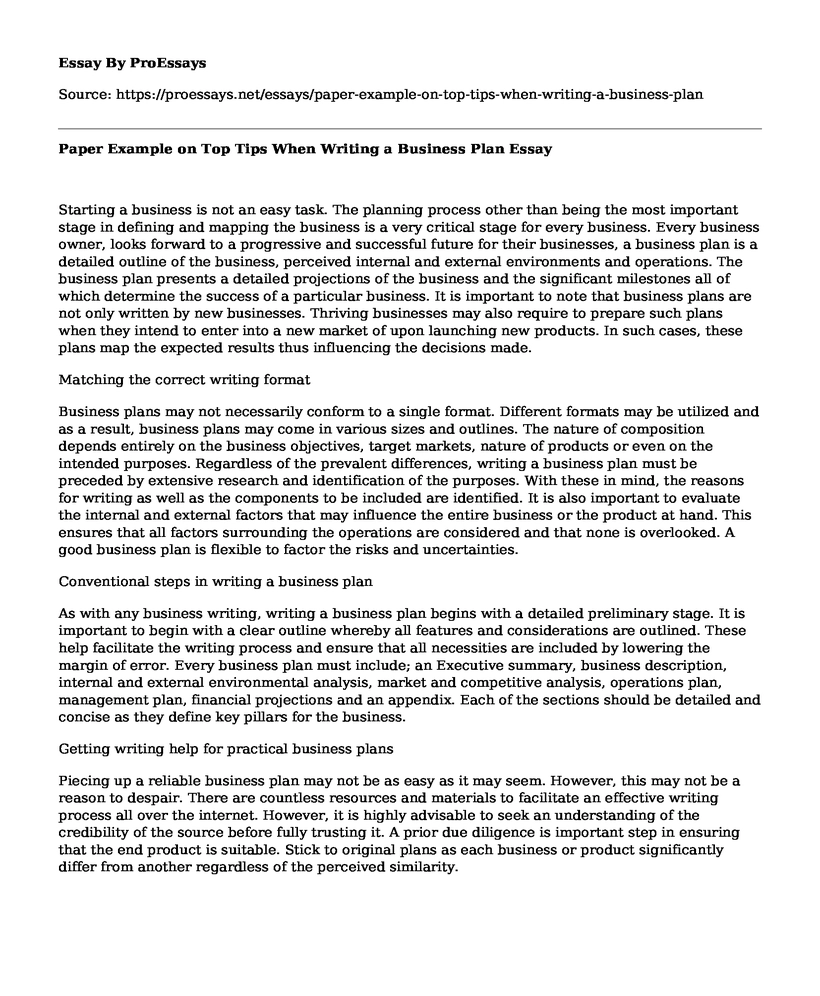Starting a business is not an easy task. The planning process other than being the most important stage in defining and mapping the business is a very critical stage for every business. Every business owner, looks forward to a progressive and successful future for their businesses, a business plan is a detailed outline of the business, perceived internal and external environments and operations. The business plan presents a detailed projections of the business and the significant milestones all of which determine the success of a particular business. It is important to note that business plans are not only written by new businesses. Thriving businesses may also require to prepare such plans when they intend to enter into a new market of upon launching new products. In such cases, these plans map the expected results thus influencing the decisions made.
Matching the correct writing format
Business plans may not necessarily conform to a single format. Different formats may be utilized and as a result, business plans may come in various sizes and outlines. The nature of composition depends entirely on the business objectives, target markets, nature of products or even on the intended purposes. Regardless of the prevalent differences, writing a business plan must be preceded by extensive research and identification of the purposes. With these in mind, the reasons for writing as well as the components to be included are identified. It is also important to evaluate the internal and external factors that may influence the entire business or the product at hand. This ensures that all factors surrounding the operations are considered and that none is overlooked. A good business plan is flexible to factor the risks and uncertainties.
Conventional steps in writing a business plan
As with any business writing, writing a business plan begins with a detailed preliminary stage. It is important to begin with a clear outline whereby all features and considerations are outlined. These help facilitate the writing process and ensure that all necessities are included by lowering the margin of error. Every business plan must include; an Executive summary, business description, internal and external environmental analysis, market and competitive analysis, operations plan, management plan, financial projections and an appendix. Each of the sections should be detailed and concise as they define key pillars for the business.
Getting writing help for practical business plans
Piecing up a reliable business plan may not be as easy as it may seem. However, this may not be a reason to despair. There are countless resources and materials to facilitate an effective writing process all over the internet. However, it is highly advisable to seek an understanding of the credibility of the source before fully trusting it. A prior due diligence is important step in ensuring that the end product is suitable. Stick to original plans as each business or product significantly differ from another regardless of the perceived similarity.
Cite this page
Paper Example on Top Tips When Writing a Business Plan. (2021, Mar 24). Retrieved from https://proessays.net/essays/paper-example-on-top-tips-when-writing-a-business-plan
If you are the original author of this essay and no longer wish to have it published on the ProEssays website, please click below to request its removal:
- Paper Example on Wal-Mart and What It Means for the Foreign Market
- Refection Essay on Three Social Entrepreneurs LinkedIn Profile
- Strategic Management in Hospitality Paper Example
- Decision Making for an International Business Essay Example
- Enterprise Purchasing Process - Essay Sample
- Essay on Tackling the Tough Decision: Dealing With a Bribe in Russia
- The Legacy of Maggie L. Walker: An Iconic Entrepreneur & Civil Rights Activist - Essay Sample







